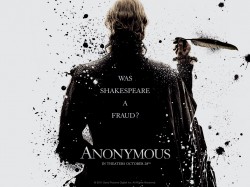 Did William Shakespeare really write “Romeo and Juliet,” “Hamlet,” or “Julius Caesar”? Yes, yes he did, but apparently director Roland Emmerich has a strong suspicion otherwise. His historical/political thriller, “Anonymous,” is very much like a Shakespearean tragedy itself.
Did William Shakespeare really write “Romeo and Juliet,” “Hamlet,” or “Julius Caesar”? Yes, yes he did, but apparently director Roland Emmerich has a strong suspicion otherwise. His historical/political thriller, “Anonymous,” is very much like a Shakespearean tragedy itself.
The movie opens with known member of the Royal Shakespeare Academy, Derek Jacobi, giving the prologue to a play called “Anonymous.” He offers the possibility that Shakespeare was actually illiterate and a puppet for someone else. Edward de Vere (Rhys Ifans), the 17th Earl of Oxford, is plotting to overthrow Queen Elizabeth’s (Vanessa Redgrave) right hand man, the corrupt William Cecil (David Thewlis). After realizing how influential and powerful a play can be, he convinces playwright Ben Jonson to take his plays and pass them off as his own. The Earl’s main goal is to stop Cecil from putting the Scottish James Stuart in power to succeed the Queen. In a collection of flashbacks to five and 40 years earlier, scandals are revealed in the royal court between the Earl and the Queen. When Jonson refuses to take on the plays, bum actor Will Shakespeare gladly takes the post, provided that he would be paid a large fee.
Roland Emmerich, known for disaster movies (“Independence Day,” “Day After Tomorrow”), directs “Anonymous” with a steady hand, everything was organized and nothing was over- or under-done. The whole cast complemented each other perfectly; I have no criticisms. Even in very dramatic moments, i.e. Edward de Vere telling his wife that he can only get rid of the voices in his head is by writing them down, no one ever seemed to be over-dramatic.
The entire story is filled with little scenes that are reminiscent of Shakespearean plays like “Hamlet,” and are full of back-door plotting and backstabbing. While I was bothered by the fact that Edward de Vere was wearing eyeliner, and the many, many historical inaccuracies (including Queen Elizabeth never having children, and Shakespeare’s plays not truly being all that popular in his time) the scenery and props looked genuine. All the characters looked exactly like the historical images of them, which I found refreshing.
I personally found “Anonymous” to be stunningly made, but I understand that it might be confusing for people who don’t know the history of Tudor England. For some others, the frequent jumps with flashbacks can be hard to follow. But to me, “Anonymous” was a great work of art.

